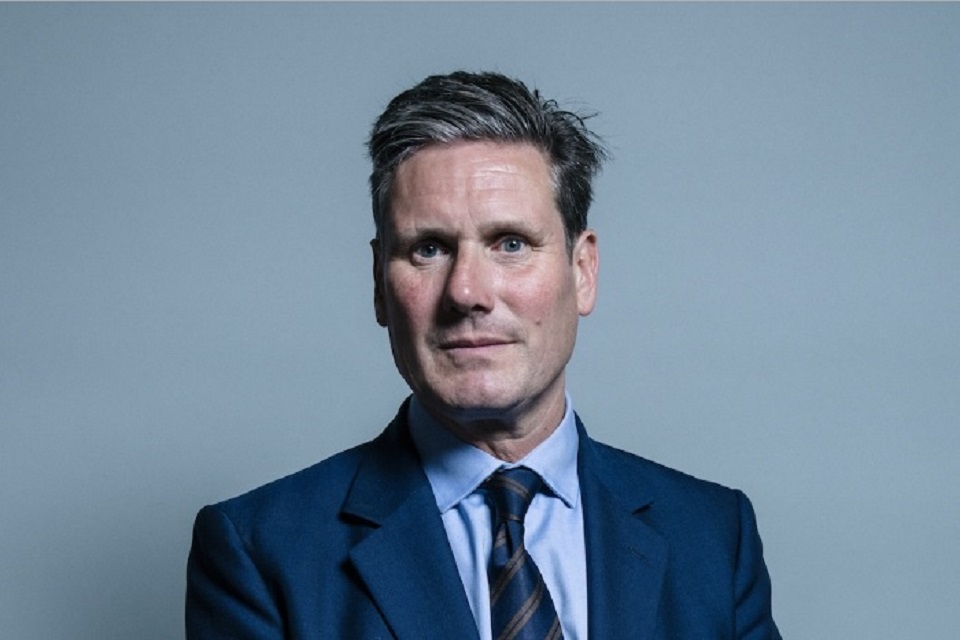Cowper’s Cut 330: Labour won: now what? Can the NHS be unbroken?

“This December 2020 Tory Party party video obtained by the Mirror is likely to help get Labour well over the line into Government in 2024. Tactical voting evidence from the local elections already strongly suggested that The Conservative And Unionist Party was set to get smashed at the General Election, but this video is powerful.”
Cowper’s Cut 275: The War For Streeting’s Ear - June 2023.
As I predicted a year ago, the Conservative And Unionist Party got what it deserved at the 2024 General Election: it got smashed.
Their Forty New (If Fictional) Hospitals did not save them.

Sir Keir Starmer’s first speech as Prime Minister is here. Once again, I think my 2022 comments about him hold up OK: “by the time we get to the end of this Parliament, I suspect the image of a somewhat dull, safe-pair-of-hands, chairman-of-the-board figurehead might suit the Labour Party's current leader rather well.
“It's easy to forget that Sir Keir Starmer has turned Labour around from a highly messy position to becoming a credible opposition within just two and a half years, and done so in the middle of a pandemic. I doubt he'll mind being under-estimated.”
Cowper’s Cut 218: Gray Day approaches as problems multiply - May 2022.
At least there weren’t ‘24 hours to save the NHS’
Despite the level of public concern, and NHS England’s pro tem chief executive Amanda Pritchard’s fanciful claim that the NHS would be “front and centre in the election campaign, as it always is”, 2024’s general election campaign proved to be remarkably NHS-light.
(Still, at least we didn’t have to hear that there were ‘24 hours to save the NHS’.)
Why was the NHS, in GE2024 political terms, the dog that didn’t bark?
This seems to be down to the mundane apocalypse having lowered people’s expectations so very, very far. The debate about the NHS and social care that we have seen over these past six weeks would scarcely leave the average voter feeling much wiser or better-informed about the real root causes of the problems, and the main parties’ planned solutions.
The Conservative And Unionist Party didn’t want to talk about the NHS because such is its state after almost a decade and a half of their stewardship that their only option was to run from their record, rather than run on it.
The Labour Party didn’t want to go around stirring up lots of hope because then they’d have to deal with raised public expectations meeting a remarkably broken NHS. (I wrote this section using the ‘b’ word before Mr Streeting’s first statement as SOS, which is covered below.)
It remains unclear whether Labour have detailed plans for NHS reform about which they haven’t talked, and have been strategically under-promising to operationally over-deliver. Let’s hope so - although hope is not a plan.
Last pre-election words

In a pre-election interview with Health Service Journal, Labour’s then-shadow SOS Wes Streeting said that trusts should plan to pay staff around ’time-and-a-half’ for extra waiting list initiative work in evenings and at weekends. This is, as many people have noted, less than staff are currently being paid for this kind of extra, backlog-busting work.
It seems likely that this proposed figure will become a subject for debate. There is also the very high marginal tax rate for pay over £100,000, which can hit 60%. This will unquestionably impact on consultants, who are being asked to do such extra sessions.
Marginal rates *matter*. If you're trying to persuade a doctor to work more days, or a surgeon to take more hours, then they'll want to take home more than 29p in every £.
— Dan Neidle (@DanNeidle) June 18, 2024
A vote of confidence in Amanda Pritchard

Mr Streeting also told HSJ that he has “total confidence” in NHS England chief executive Amanda Pritchard. It’s nice to hear that somebody, somewhere does.
To be fair to HSJ, they had to ask: to be fair to Mr Streeting, he had to give an answer. HSJ reports that Mr Streeting stressed this was a genuine belief and not a “political” statement.
If I were a cynical person (and thank the Lord I’m not, sir!), then I’d wonder what Mr Streeting had total confidence in Mrs Pritchard doing.

This interview dropped in the wake of The Guardian’s Denis Campbell’s risibly wrong story about Alan Milburn, Jacqui Smith and Sally Morgan being contenders to take over as NHS England chair from Richard Meddings. Jacqui Smith has been appointed as an education minister in the Lords; Milburn is clearly not up for chairing without knowing who is the next CE (see below). It’s well up to Denis’ usual high standards.
Mr Streeting’s statement
It is now the policy of the Government that our NHS is broken.
— Wes Streeting MP (@wesstreeting) July 5, 2024
It will be the mission of my department, every member of this government, and the 1.4 million people who work in the NHS, to turn our health service around.
That work starts now.pic.twitter.com/G6tJlOWuLf
Taking up the substantive role he has shadowed for some years now, Mr Streeting recorded a clip, disseminated by the Department For Health But Social Care, and released this statement.
Welcome Secretary of State for Health and Social Care @WesStreeting.
— Department of Health and Social Care (@DHSCgovuk) July 5, 2024
We look forward to helping you deliver the government’s mission to build an NHS fit for the future. pic.twitter.com/WN02CJZaBf
It doesn’t fuck about: Mr Streeting boldly states that “when we said during the election campaign, that the NHS was going through the biggest crisis in its history, we meant it. When we said that patients are being failed on a daily basis, it wasn’t political rhetoric, but the daily reality faced by millions.
Previous governments have not been willing to admit these simple facts. But in order to cure an illness, you must first diagnose it. This government will be honest about the challenges facing our country, and serious about tackling them.
From today, the policy of this department is that the NHS is broken.”
Mr Streeting’s explicit statement that the NHS is “broken” contrasts interestingly with NHS England pro tem CE Amanda Pritchard’s insistence in her ConfedExpo speech that the NHS is “damaged but it is not destroyed”, and NHS England’s general Pollyannaism about how terribly well everything’s been going.
But of course, Mr Streeting has full confidence in Mrs Pritchard.
He said so in an HSJ interview, so it must be true.
Will the NHS be unbroken?
I hadn’t really thought that a Habershon/Gabriel hymn was going to be the narrative of NHS reform in 2024, but there we go: life is full of surprises.
Can the NHS be unbroken? Well, yeah, but not quickly. In the words of the song, “by and by, Lord: by and by”.
In the words of another great song, “it’s gonna take time, a whole lot of precious time … it’s gonna take money, a whole lot of spending money”.
The Milburn return
Cowper’s Cut subscribers have known for some time that Alan Milburn has been advising Wes Streeting.
As I wrote two weeks ago, Darlington’s finest had been in conversations with the Labour leadership about the chair role at NHS England, but was not willing to make a commitment without knowing who will replace Amanda Pritchard as chief executive.

News of Mr Milburn’s return to actively and openly advising the new Labour Government was carried to the general public by the Boris Johnson Fanzine, in this amusing article.
It quotes a name-free Labour source as saying, “it was the reforms on transparency, choice, and use of the private sector that delivered the goods on cutting waiting lists and making the NHS sustainable for the long term”.
On reading this, I laughed until I stopped. It sounds an awful lot like something that Mr Milburn would have said himself.
If this ‘Labour source’ is not Mr Milburn, and actually exists in The Real World (as opposed to being made up for journalistic convenience), then she or he is spectacularly ill-informed about what worked in the 2000s NHS reforms.
And we know what did work: The Kings Fund wrote an actual book on it, (one of whose authors is newly-elected Labour MP Anna Dixon, for Shipley.) ISTCs and patient choice made a bit of difference at the margins, but most of the backlog-cutting work of that era was done by NHS staff working waiting lists initiative extra sessions in the evenings and at weekends, in NHS facilities.
It will be the same this time.
Those curious as to what Mr Milburn will be advising could read his Foundation Trust Network lecture from 2014, or his 2000 set-piece London School of Economics speech on NHS reform. I wrote this about his 2011 intervention in the debate about the Lansley reforms.
Probable finance initiative

Among the urgent problems facing the new Government in un-breaking NHS is that of the £12 billion capital and maintenance backlog.

There have been a lot of hints over recent months about some variant on the Private Finance Initiative making a comeback in the NHS. NHS Providers chief executive Julian Hartley’s briefed Guardian piece is a blatant (and almost certainly set-up) endorsement of this agenda.
So, more PFI. A good idea, or an appalling one?
It all depends on the contracts. There are A Lot Of Lessons to learn from each wave of NHS PFIs.
There is a big, real problem with the English NHS £12 billion capital and maintenance backlog, almost 2/3 of which presents real risks to staff and patients. This was caused by many years of capital-to-revenue transfers to hide the NHS’s poor financial position.
The main critique of PFI is that Governments can in theory always borrow money more cheaply than markets. The main critique of public sector procurements is that NHS history suggests that you tend to get two hospitals for the price of three.
NHS history also tells us that then budgets are tight, maintenance is cut or delayed. Which leads over time to a huge backlog.
The NHS PFI contracts did not contain gain-share arrangements regarding refinancing when interest rates dropped. History shows that this was highly lucrative for PFI companies. A lesson to learn.
One appeal of PFI was to make scrimping on maintenance and using cheap but problematic materials such as RAAC deeply unattractive.
Set against this, local NHS organisations’ ability to tightly manage the delivery against commitments of their PFI contracts was, shall we say, variable. Even before the Lansley reforms cut NHS management by 45% of the 2008-9 level.
And there was no national oversight of how trusts managed their PFI contracts, which was and remains a huge omission.
There is a big issue with PFI contracts about changing things. Like lightbulbs. Trusts with early PFIs often paid exorbitant sums for relatively minor building adaptations because the contracts were vague. Given how healthcare delivery is sure to change in the era of genetic and personalised medicine, this needs careful thought.
It’s worth learning from how the private sector treats their (much smaller, and very much not full-service) UK hospitals. The lack of sentiment is profound. Once they start needing costly refits, they are simply sold to someone less savvy. This is also possible because private hospitals are not ‘anchor institutions’ in their communities, in the way that NHS hospitals are. (See also ‘universities’.)
Ultimately, whether or not the health policy community likes PFI, it looks a lot like this will be happening. So it needs to be done in the most effective way possible.
I have no idea whether the legal, managerial and organisational competence exists in the Department For Health But Social Care to ensure this.
I am stone cold certain that it does not exist in the busted flush that is NHS England.
Recommended and required reading
Rebecca Thomas of The Independent has been leaked the independent report into the NMC, and it is not going to be pretty reading.
Chartered Management Institute report on improving UK management.
Shaun Lintern’s Sunday Times piece on what comes next is decent.
Dave West’s HSJ piece on what comes next is, too.




